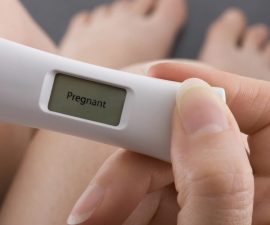An early miscarriage, known as a chemical pregnancy, occurs when a fertilized egg fails to fully implant in the uterus, resulting in pregnancy loss before the fifth week.
These types of pregnancies, also referred to as biochemical pregnancies, are prevalent and research suggests that up to 25% of all pregnancies may end in a chemical pregnancy even before a woman misses her period or shows any signs of pregnancy.
The term “chemical pregnancy” refers to a positive result on a blood or urine test that detects the presence of the hormone human chorionic gonadotropin (hCG), indicating pregnancy.
However, many women may not even realize they were pregnant because the loss occurs so early, without any symptoms or a missed period. Instead, they may only experience a delayed period that is slightly heavier than usual.
How do you know if you are having a chemical pregnancy?
Have you ever taken a pregnancy test and received a positive result, only to start your period shortly after?
Or have you taken multiple pregnancy tests that started positive, but the results became weaker over time until they eventually became negative? If you answered yes to either of these questions, you may be experiencing a chemical pregnancy.
Although pregnancy tests are typically accurate, they are not foolproof and cannot guarantee a successful pregnancy.
Unfortunately, it is possible to receive a false positive result, meaning that the test is positive but there is no pregnancy. This can be both confusing and devastating for those trying to conceive.
Signs and Symptoms of Chemical Pregnancy
Chemical pregnancies are believed to occur for the same reasons as most miscarriages, which is due to abnormal chromosomes in the developing fetus. If there are an excessive or insufficient number of chromosomes, it can lead to a miscarriage.
Given that chemical pregnancies occur very early after conception, some women may not realize that they are pregnant. Women who do know or suspect that they have had a chemical pregnancy may experience the following symptoms:
- Slight spotting a week before your expected period
- Mild abdominal cramps
- Vaginal bleeding shortly after a positive pregnancy test
- Decreasing pregnancy hormone levels, as detected by a blood test
- Late period
- Heavy period-like bleeding, including clots
However, it is possible for some women to have a chemical pregnancy without experiencing any symptoms, mistaking it for a regular period.
A medical professional can confirm a chemical pregnancy through a urine or blood test to check the level of hCG present in the body.
Signs of Chemical Pregnancy at 4 Weeks
A chemical pregnancy is a term used to describe an early pregnancy loss that occurs before the fifth week of gestation. It is called a “chemical” pregnancy because the pregnancy is only detected through chemical means, such as a pregnancy test, and not through ultrasound or other physical means.
The signs of a chemical pregnancy can vary, but there are some common symptoms that women may experience at four weeks.
- Vaginal Bleeding
One of the most common signs of a chemical pregnancy is vaginal bleeding. This bleeding is usually light and may be mistaken for a period.
However, it may be darker or lighter than usual, and may only last a few days. It can be difficult to distinguish between a chemical pregnancy and a regular period, but if you experience any unusual bleeding, it is important to talk to your healthcare provider.
- Positive Pregnancy Test Followed by Negative Test
Another sign of a chemical pregnancy is a positive pregnancy test followed by a negative test. This can occur when the pregnancy hormone (hCG) levels rise initially but then drop rapidly, indicating that the pregnancy is no longer viable.
- Menstrual-Like Cramping
Many women experience menstrual-like cramping during early pregnancy, but this can also be a sign of a chemical pregnancy. The cramping may be mild or severe and may be accompanied by vaginal bleeding or spotting.
- Slight Spotting
Spotting is another sign of a chemical pregnancy. This is usually light and may be pink or brown in color. It may only last a few days, or it may come and go over a few weeks.
- Low hCG Levels
A chemical pregnancy can also be detected through a blood test that measures hCG levels. If the levels are low, or if they rise initially but then drop rapidly, it may indicate a chemical pregnancy.
It is important to note that not all women experience symptoms of a chemical pregnancy. Some women may mistake it for a regular period, while others may not even realize that they were pregnant. If you suspect that you have experienced a chemical pregnancy, it is important to talk to your healthcare provider.
What causes a chemical pregnancy?
The majority of early pregnancy losses, including chemical pregnancies, are attributed to chromosomal abnormalities.
During the early stages of pregnancy, 23 chromosomes from each partner combine to form a zygote that contains 46 chromosomes. The zygote begins to grow through rapid cell division, develops into a blastocyst, and ultimately implants into the uterine wall.
However, in the case of a chemical pregnancy, implantation is not completed due to a variety of factors. Possible reasons for a chemical pregnancy may include:
- Too many or too few chromosomes in the egg or sperm.
- An abnormal number of chromosomes in the zygote after conception.
- Chromosomal abnormalities leading to developmental errors in the embryo.
- Infection, such as chlamydia.
- Hormonal imbalances.
- Low body mass index (BMI).
Chromosomal abnormalities occur randomly and can affect anyone, but the risk increases significantly with age.
Nevertheless, experiencing a chemical pregnancy does not imply an inability to become pregnant and carry a baby to term in the future.
How is the diagnosis and treatment of a chemical pregnancy done?
Experiencing a chemical pregnancy or any type of bleeding can be a frightening experience, so it is recommended that you consult your healthcare provider immediately.
They will begin a series of investigations, which may include blood and urine tests, to monitor your hCG levels and determine whether you have experienced a chemical pregnancy. They may also inquire about your last period and whether it was typical for you.
There are no treatments available for the physical symptoms of a chemical pregnancy. The bleeding may stop on its own within a week.
However, if you experience discomfort, bleed through more than one pad per hour, or if the bleeding persists beyond a week, consult your doctor for guidance.
It is critical to be compassionate with yourself at this time and understand that you did nothing wrong. If you require emotional support, speak to your doctor about accessing loss and mental health services.
Strategies for Conceiving After Experiencing a Chemical Pregnancy
If you’ve been trying to conceive and have experienced a chemical pregnancy, you may have many questions about what to do next. Here are seven tips to help you get pregnant after a chemical pregnancy:
- Track Your Menstrual Cycle
Monitoring your menstrual cycle is vital when trying to conceive. This helps you determine when ovulation is likely to occur and when your fertile window is. There are several ways to track your menstrual cycle, including using ovulation prediction kits or tracking basal body temperature.
- Have Regular Sex
Having frequent sex during your fertile window, which includes the day of ovulation and five days before, can increase your chances of conceiving.
- Take Prenatal Vitamins
Taking prenatal vitamins that contain at least 400 micrograms of folic acid is important when trying to conceive. Folic acid can help prevent birth defects in the baby.
- Maintain a Healthy Body Weight
Being underweight or overweight can reduce your chances of conceiving. Aim for a healthy body weight to increase your odds of getting pregnant and having a healthy baby.
- Eat a Healthy Diet
Eating a healthy diet can help prepare your body for pregnancy by ensuring you have enough essential nutrients. Limit your intake of high-mercury fish and white tuna to avoid fertility issues.
- Quit Smoking and Drinking
Smoking and drinking can both negatively affect fertility. Quitting smoking and avoiding alcohol can increase your chances of getting pregnant.
- Consult Your Doctor
If you experience multiple chemical pregnancies, it’s important to speak with your doctor to rule out any underlying medical conditions. This could include abnormal hormonal levels or other issues that may be affecting your ability to conceive.
Is a Chemical Pregnancy Considered a Type of Miscarriage?
Chemical pregnancies, unfortunately, occur quite frequently, with 50-75% of all miscarriages being categorized as such. A chemical pregnancy is a very early miscarriage that typically occurs before 5 weeks of gestation.
The name stems from the fact that it can only be confirmed by the presence of the pregnancy hormone, hCG, and is not visible on an ultrasound this early.
It is completely normal to feel a wide range of emotions during this time. Experiencing any form of pregnancy loss can be extremely devastating, regardless of how far along the pregnancy was.
While chemical pregnancies are common, it does not make dealing with the loss any easier emotionally. It is essential to give yourself time to heal and make decisions about the next steps.
Remember that this is not your fault, and having a successful pregnancy in the future is still entirely possible.
Only 1% of women experience repeated miscarriages, which means 99% of women go on to have viable pregnancies after a loss.
How to prevent chemical pregnancy
Although there is no surefire way to prevent miscarriage, there are several lifestyle changes you can implement before and during pregnancy to lower your risk. Here are some things you can do before getting pregnant to reduce your chances of miscarrying:
If you’ve had a miscarriage before, consult your doctor to undergo tests that can identify any underlying issues. Some of these issues can be treated to enhance your chances of carrying a pregnancy to term.
For instance, checking for blood clotting disorders can allow for treatment with blood thinners to support future successful pregnancies.
- Maintain a healthy diet and exercise routine
Being as healthy as possible before getting pregnant can help reduce the likelihood of a miscarriage. Quit smoking before pregnancy, as smoking during pregnancy can increase the risk of miscarriage.
- Maintain a healthy weight
Obesity and diabetes can lead to other complications during pregnancy, as well as raise your risk of miscarrying. Get diabetes under control before pregnancy and lose weight if necessary.
- Limit caffeine before conception
A study by the National Institutes of Health showed that the risk of miscarriage was higher if either partner drank two or more caffeinated beverages in the weeks before conception.
Here’s what you can do during pregnancy to lower your risk of miscarriage:
- Maintain a healthy diet and exercise routine
Being at a healthy weight and having a healthy diet and exercise routine is important for having a healthy pregnancy,” according to Nathan.
- Take prenatal vitamins
Folic acid, calcium, iron, and vitamin D can help keep both you and your baby healthy. The better nourished you are during pregnancy, the better your chances of carrying a healthy pregnancy.
- Don’t smoke and avoid secondhand smoke
A systematic review published in the American Journal of Epidemiology in 2014 found that each cigarette smoked per day increased the relative risk of miscarriage by 1 percent. The study also showed that secondhand smoke increased the risk of miscarriage by 11%.
- Avoid using illicit drugs
Amphetamines, cocaine, and marijuana can all increase the risk of miscarriage, according to the Cleveland Clinic.
- Don’t drink alcohol
A study published in Alcoholism: Clinical and Experimental Research in 2019 found that consuming alcohol during pregnancy increased the risk of miscarriage by 19%.
Consulting Your Doctor about Chemical Pregnancy: Is it Necessary?
Although a chemical pregnancy usually does not require medical intervention, it is still advisable to inform your doctor about it. Chromosomal abnormalities are the most common cause of chemical pregnancy, and there may not have been anything that could have been done to prevent it.
However, if you experience recurring chemical pregnancies, medical intervention may be necessary to identify the underlying cause. Your doctor may perform an ultrasound to look for any anatomical issues and conduct laboratory testing, including progesterone, clotting factors, and a thyroid panel.
Taking a prenatal vitamin every day is highly recommended, especially if you have not already started. These vitamins provide the essential nutrients needed to support a healthy pregnancy. It’s a good idea to consult with your doctor to determine which prenatal vitamin is best for you.
After a Chemical Pregnancy: What to Expect and Next Steps
Experiencing a chemical pregnancy can bring about various emotions. Taking care of your mental and physical well-being is essential during this period.
Some women find solace in confiding in their partner, friend, or doctor, while others prefer engaging in hobbies or even attempting to conceive again as a part of their healing process.
Remember that you are strong, and your body is capable of accomplishing incredible things. Whenever you feel ready, know that you have an amazing support system to assist you in taking control of your fertility.
Final Words
Processing a chemical pregnancy can be challenging, as losing a pregnancy in the early weeks of conception can be a lot to handle in a short time. However, Mya’s experience shows that you are not alone and there is hope for future pregnancies.
The cause of chemical pregnancies remains unknown, and it can be mistaken for a regular period. If you have experienced bleeding outside of your usual period or suspect a chemical pregnancy, it’s essential to talk to your healthcare provider.
While there is no specific treatment for the physical symptoms of a chemical pregnancy, your doctor can provide emotional support during this difficult time.














